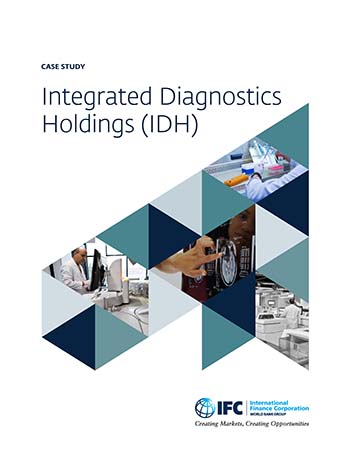The COVID-19 pandemic has raised awareness around the world of the value of diagnostic tests. The presence of viable, accessible, cost-efficient testing laboratories can make all the difference to the quality and breadth of healthcare in a region. In many countries, a great deal of testing is conducted by government-operated laboratories, but they may suffer from underinvestment that limits their reach and effectiveness. Privately-owned testing laboratories, which tend to be more entrepreneurial, can provide an additional route for needed testing. They also can help set higher standards for quality. This is because they are more likely to keep up with new technologies and practices and they may have more incentives to continually raise the quality of their services because of the competition they face. By expanding availability of reliable diagnostic services, private laboratories can be a strong partner for governments seeking to meet public health goals, especially in times of health crises.
Integrated Diagnostics Holdings (IDH), a Cairo-based network of testing laboratories that operates in Egypt, Jordan, Nigeria, and Sudan, has demonstrated how a private-sector testing laboratory can contribute to the overall health and well-being of a region. Founded in 1979 by Moamena Kamel, MD, a professor of immunology with a PhD in immunology from Cairo University, IDH is now run by her daughter, Dr. Hend El Sherbini. Dr. El Sherbini holds a master’s degree in Public Health from Emory University, a PhD in immunology from Cairo University, where she also teaches, and an executive MBA from the London Business School. Before becoming CEO, she held a research position in molecular biology at the U.S. Centers for Disease Control and Prevention.
Although IDH is a family-founded business, it is a publicly held company. Dr. El Sherbini and her mother own 25 percent of the stock. The rest is traded on the London Stock Exchange, where IDH is one of a very few Egyptian companies listed. When its initial public offering in 2015 produced a market capitalization of $668 million, Forbes magazine speculated that IDH might be the only woman-led Middle East company to ever raise money that way. “There are not many companies like IDH,” Dr. El Sherbini told the magazine. “Doctors run most of the healthcare companies, and they don’t have management backgrounds.”
Timeline
IDH is a leading proponent of global radiology and diagnostic best practice. The company has grown, in part through mergers and acquisitions, to encompass more than 500 branches in the four countries where it operates. It offered more than 27 million diagnostic tests in its fiscal year 2020, in 2,000 different forms, ranging from basic blood glucose tests for diabetes to advanced molecular testing for genetic disorders. It also offers radiology services in Egypt and Nigeria and house calls for those who cannot get to a lab. IDH is very disciplined in maintaining affordable prices, even when its own costs rise, because of its customer base. Walk-in patients, who typically lack health insurance, represent about 30 percent of the testing population. Other tests are generally subsidized by IDH’s preferred arrangements with institutional and corporate clients, but even here, group discounts are common.
As IDH’s activities underscore, diagnostic tests are key to managing health crises. The company played a major role in fighting the COVID-19 pandemic in Jordan and Egypt, where it offers tests for detecting coronavirus variants. Broad accessibility of testing is a core aspect of IDH’s business purpose.
The company’s overall compound annual revenue growth rate was 21 percent between 2015 and 2020, and it is headed for further expansion, backed by the International Finance Corporation’s financial and advisory services. IFC has provided training to IDH to strengthen healthcare quality, and it organized a $45 million financing package in 2021, designed to help the company expand its geographic footprint and service offerings. In addition, IDH has joined the Ethical Principles in Health Care (EPiHC), an initiative of IFC and the World Bank that supports responsible behavior in healthcare.
During the next few years, biomedical advances are expected to accelerate, affecting the kinds of diagnostics available and the ability to prescribe and administer early treatments of many diseases. The capabilities of diagnostic laboratories, in both the medical and managerial spheres, will also be tested, especially in emerging economies. IDH is an example of a company looking ahead to those challenges and preparing for them now.
Lessons


